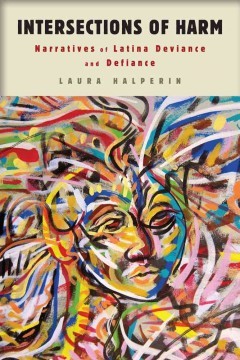| Intersections of Harm: Narratives of Latina Deviance and Defiance Contributor(s): Halperin, Laura (Author) |
|
 |
ISBN: 0813570360 ISBN-13: 9780813570365 Publisher: Rutgers University Press OUR PRICE: $38.90 Product Type: Paperback - Other Formats Published: July 2015 |
| Additional Information |
| BISAC Categories: - Social Science | Ethnic Studies - Hispanic American Studies - Literary Criticism | American - Hispanic American - Literary Criticism | Comparative Literature |
| Dewey: 810.992 |
| LCCN: 2014040946 |
| Physical Information: 0.58" H x 6" W x 9" (0.83 lbs) 254 pages |
| Themes: - Ethnic Orientation - Hispanic - Ethnic Orientation - Latino |
| Descriptions, Reviews, Etc. |
| Publisher Description: In this innovative new study, Laura Halperin examines literary representations of harm inflicted on Latinas' minds and bodies, and on the places Latinas inhabit, but she also explores how hope can be found amid so much harm. Analyzing contemporary memoirs and novels by Irene Vilar, Loida Maritza P rez, Ana Castillo, Cristina Garc a, and Julia Alvarez, she argues that the individual harm experienced by Latinas needs to be understood in relation to the collective histories of aggression against their communities. Intersections of Harm is more than just a nuanced examination of the intersections among race, ethnicity, class, gender, and sexuality. It also explores the intersections of deviance and defiance, individual and collective, and mind, body, and place. Halperin proposes that, ironically, the harmful ascriptions of Latina deviance are tied to the hopeful expressions of Latina defiance. While the Latina protagonists' defiance feeds into the labels of deviance imposed on them, it also fuels the protagonists' ability to resist such harmful treatment. In this analysis, Halperin broadens the parameters of literary studies of female madness, as she compels us to shift our understanding of where madness lies. She insists that the madness readily attributed to individual Latinas is entwined with the madness of institutional structures of oppression, and she maintains that psychological harm is bound together with physical and geopolitical harm. In her pan-Latina study, Halperin shows how each writer's work emerges from a unique set of locales and histories, but she also traces a network of connections among them. Bringing together concepts from feminism, postcolonialism, illness studies, and ecocriticism, Intersections of Harm opens up exciting new avenues for Latina/o studies. |